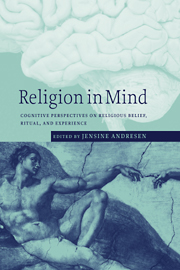Book contents
- Frontmatter
- Contents
- Notes on contributors
- 1 Introduction: towards a cognitive science of religion
- PART I BELIEF ACQUISITION AND THE SPREAD OF RELIGIOUS REPRESENTATIONS
- PART II QUESTIONING THE “REPRESENTATION” OF RELIGIOUS RITUAL ACTION
- PART III EMBODIED MODELS OF RELIGION
- 8 Cognitive study of religion and Husserlian phenomenology: making better tools for the analysis of cultural systems
- 9 Why a proper science of mind implies the transcendence of nature
- 10 Religion and the frontal lobes
- 11 Conclusion: religion in the flesh: forging new methodologies for the study of religion
- Index
9 - Why a proper science of mind implies the transcendence of nature
Published online by Cambridge University Press: 02 December 2009
- Frontmatter
- Contents
- Notes on contributors
- 1 Introduction: towards a cognitive science of religion
- PART I BELIEF ACQUISITION AND THE SPREAD OF RELIGIOUS REPRESENTATIONS
- PART II QUESTIONING THE “REPRESENTATION” OF RELIGIOUS RITUAL ACTION
- PART III EMBODIED MODELS OF RELIGION
- 8 Cognitive study of religion and Husserlian phenomenology: making better tools for the analysis of cultural systems
- 9 Why a proper science of mind implies the transcendence of nature
- 10 Religion and the frontal lobes
- 11 Conclusion: religion in the flesh: forging new methodologies for the study of religion
- Index
Summary
The main intuition that animates this chapter (a substantially modified version of Varela 1997 and 1998) is that the natural roots of mind are permeated by the depth inherent in direct, lived experience. I will develop this intuition in two steps. First, the very thrust of a proper scientific analysis of mind, i.e., in the context of the cognitive sciences, leads to the need for a detailed examination of experience itself. Second, examined experience and scientific analysis can have an explicit, non-dual relationship, i.e., a mutual determination, that avoids the extremes of both neuro-reductionism and ineffability.
My contribution to this volume is to focus on the significance of human experience per se, and only by implication to consider that particular domain of human experience we call “religious.” This can be rephrased in a more constructive sense: rather than being concerned with religious experience conceived in its most obvious theological context, I am more interested in the larger domain of a (Jamesian) sense of religion as the quest for meaning and values in life. Hereafter, I will describe this simply as “spiritual experience,” and I will subsume religious experience under it. This distinction is indispensable if one is to take into account a number of non-theistic traditions such as Buddhism, Taoism, gnosticism, etc., for which the common ground is, precisely, a disciplined and transformative examination of human experience.
Commonly in spiritual traditions, human experience is not taken at face value, but it is examined in one way or another. In contrast, cognitive science has been almost entirely interested in cognitive faculties in ordinary, unexamined life.
- Type
- Chapter
- Information
- Religion in MindCognitive Perspectives on Religious Belief, Ritual, and Experience, pp. 207 - 236Publisher: Cambridge University PressPrint publication year: 2001
- 7
- Cited by



